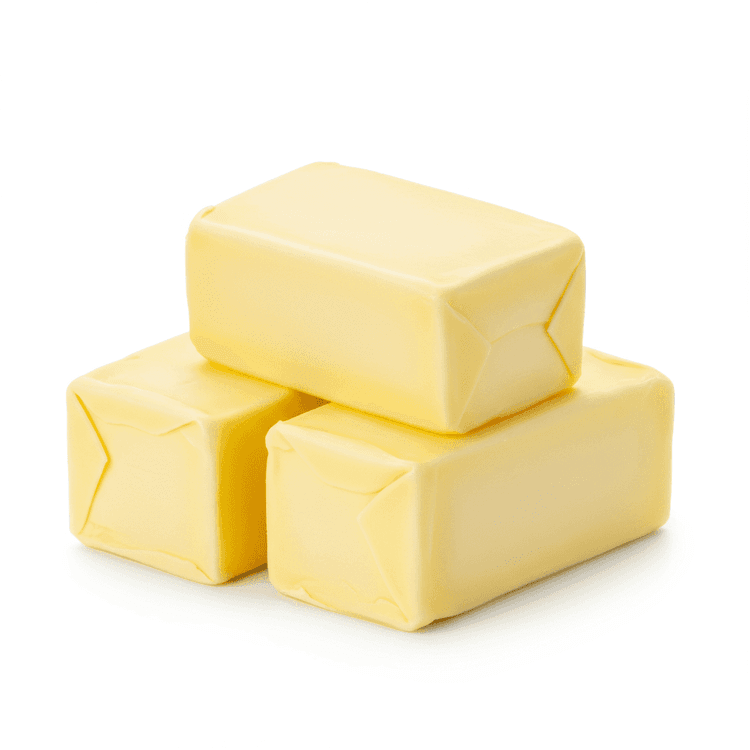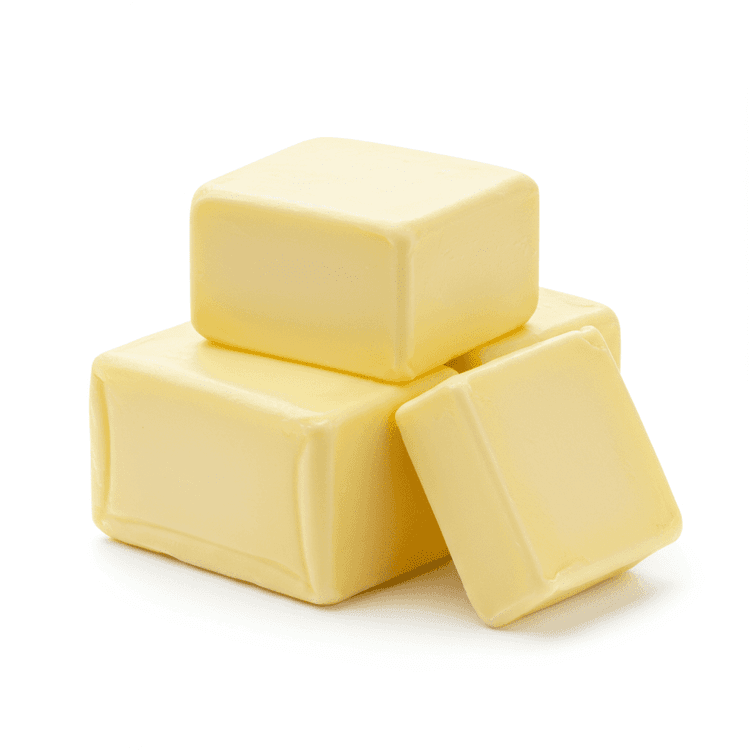
Butter
Butter is a solid dairy product made from churning fresh or fermented cream or milk, separating the fat globules from the buttermilk. It's prized for its rich, creamy flavor and smooth, spreadable texture at room temperature. Butter has a pale yellow to deep yellow color, depending on the animal's feed and the processing methods. It is a staple ingredient in both sweet and savory cooking, adding moisture, flavor, and richness to a wide variety of dishes. High-quality butter contributes significantly to the overall taste and texture of baked goods, sauces, and cooked meals.
Common Uses
- Adding richness and flavor to sauces: Butter is used to create luscious sauces like beurre blanc or hollandaise, providing a smooth and creamy texture along with a distinctive buttery flavor.
- Baking cakes, cookies, and pastries: Butter acts as a tenderizer in baked goods, contributing to a moist and delicate crumb. It also enhances the flavor and adds richness to recipes.
- Sautéing vegetables, meats, and seafood: Butter can be used to sauté ingredients over medium heat, imparting a rich flavor and golden-brown color. Its fat content helps to prevent sticking and promote even cooking.
- Spreading on bread, toast, and crackers: Butter is commonly used as a spread, providing a simple yet satisfying flavor and a smooth texture that complements many different types of bread and crackers.
- Creating flavorful compound butters: Softened butter can be mixed with herbs, spices, and other ingredients to create flavored compound butters, which can be used to enhance the flavor of grilled meats, vegetables, or bread.
- Enriching mashed potatoes and other purees: A pat of butter can be stirred into mashed potatoes, pureed soups, or vegetable purees to add richness, flavor, and a smoother consistency.
Nutrition (per serving)
Nutrition (per serving)
Calories
717.0kcal (35.85%)
Protein
0.8g (1.7%)
Carbs
0.1g (0.03%)
Sugars
0.1g (0.12%)
Healthy Fat
24.2g
Unhealthy Fat
53.7g
% Daily Value based on a 2000 calorie diet
Nutrition (per serving)
Calories
717.0kcal (35.85%)
Protein
0.8g (1.7%)
Carbs
0.1g (0.03%)
Sugars
0.1g (0.12%)
Healthy Fat
24.2g
Unhealthy Fat
53.7g
% Daily Value based on a 2000 calorie diet
Health Benefits
- Good source of fat-soluble vitamins, including A, D, E, and K, crucial for bone health and immune function.
- Contains butyrate, a short-chain fatty acid that may promote gut health and reduce inflammation.
- Provides conjugated linoleic acid (CLA), which some studies suggest may have anti-cancer properties and support weight management.
- Offers healthy saturated fats that can contribute to hormone production and cell structure.
- Energy-dense food, providing a concentrated source of fuel for the body.
Substitutes
Chefadora AI is here.
Experience smarter, stress-free cooking.
Storage Tips
Butter should be stored properly to prevent it from going rancid and absorbing odors. Unsalted butter can be stored in the refrigerator for up to two weeks past the 'sell-by' date, while salted butter lasts even longer, up to a month or more. Keep it in its original wrapping or an airtight container to minimize odor absorption. For long-term storage, butter can be frozen for several months. Wrap it tightly in freezer-safe wrapping or place it in a freezer bag.

